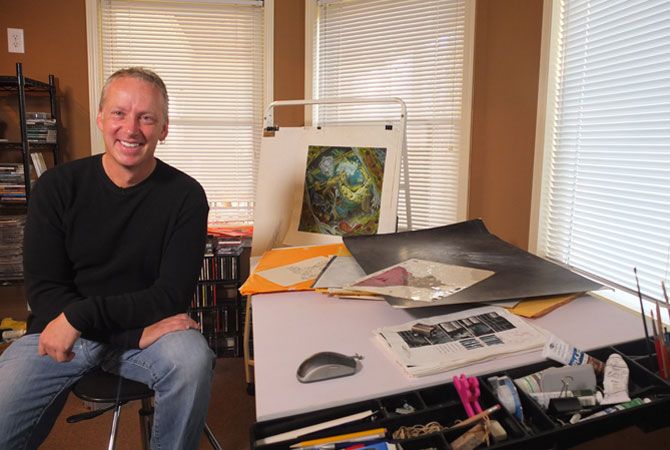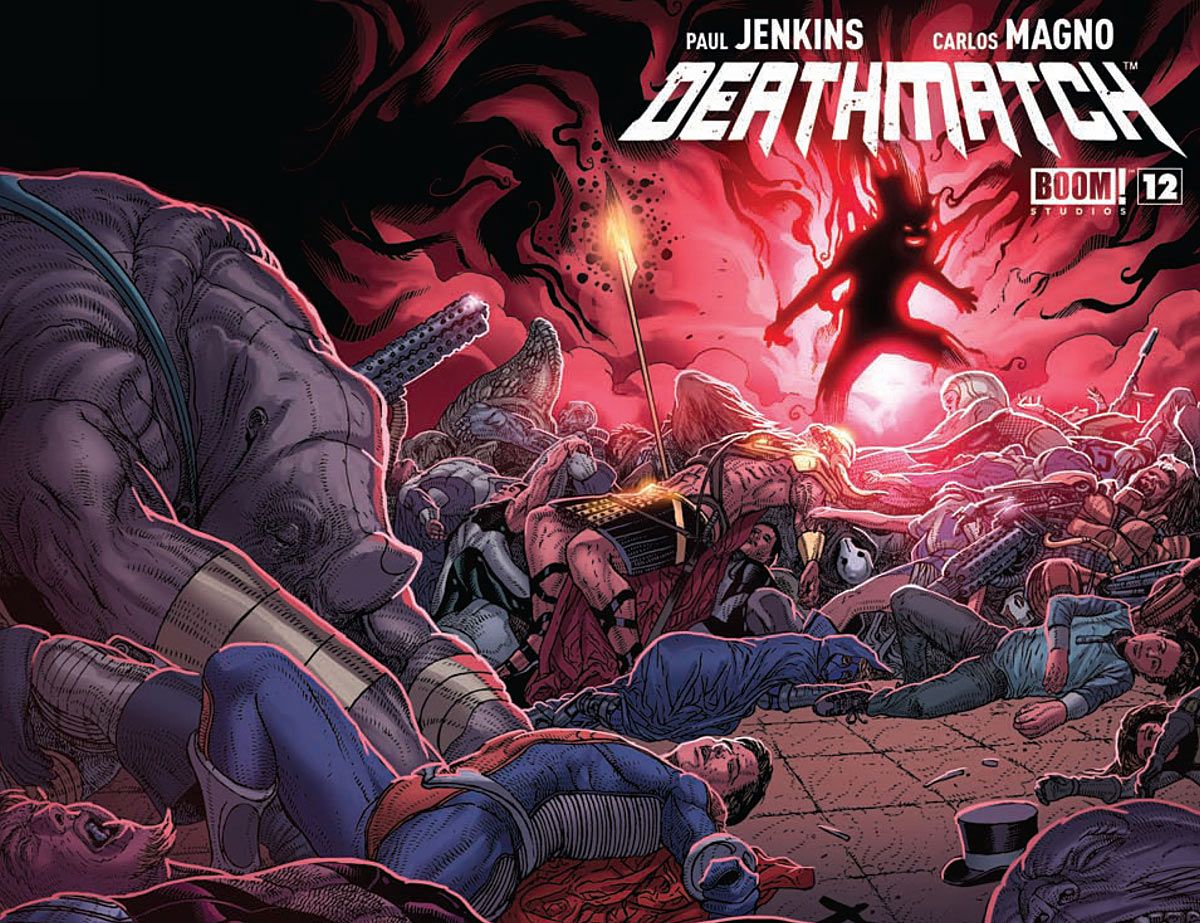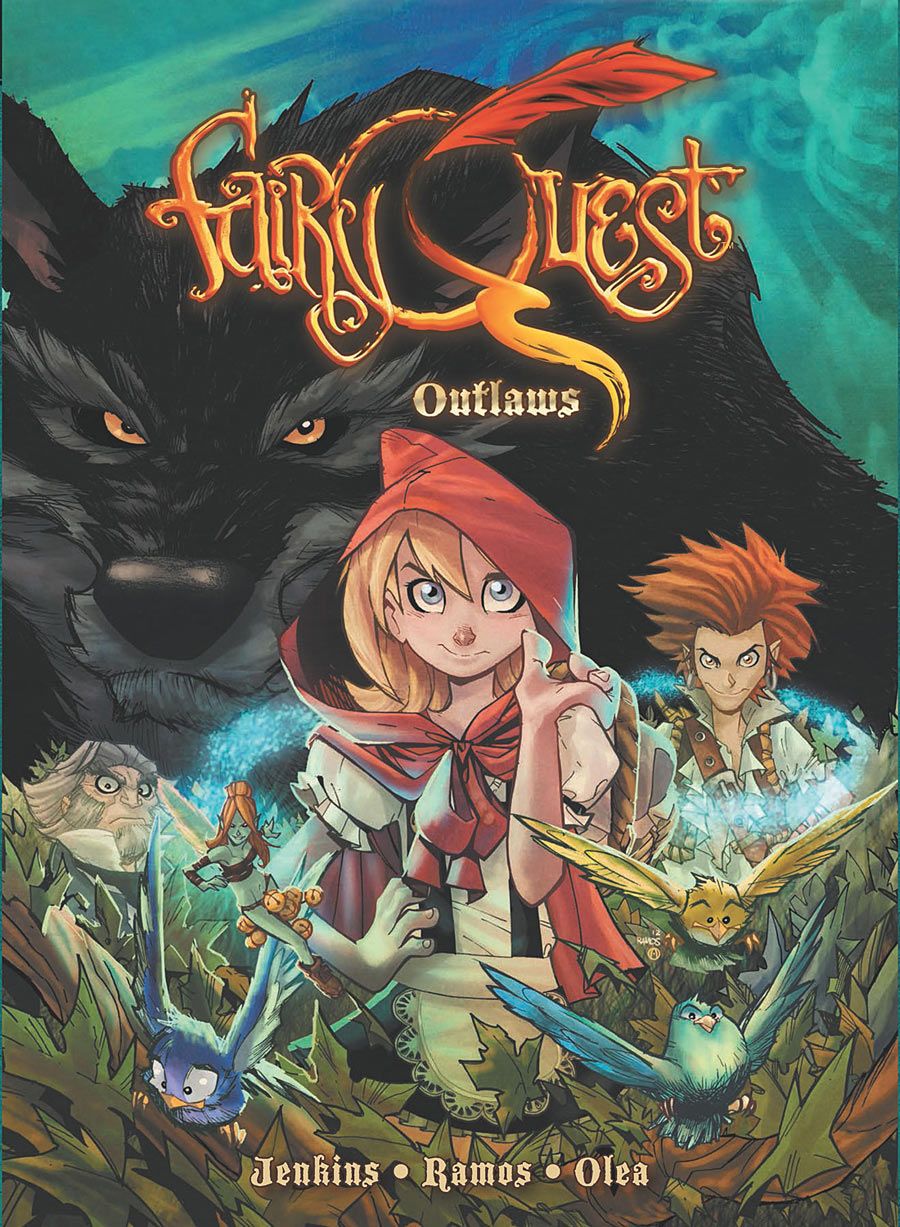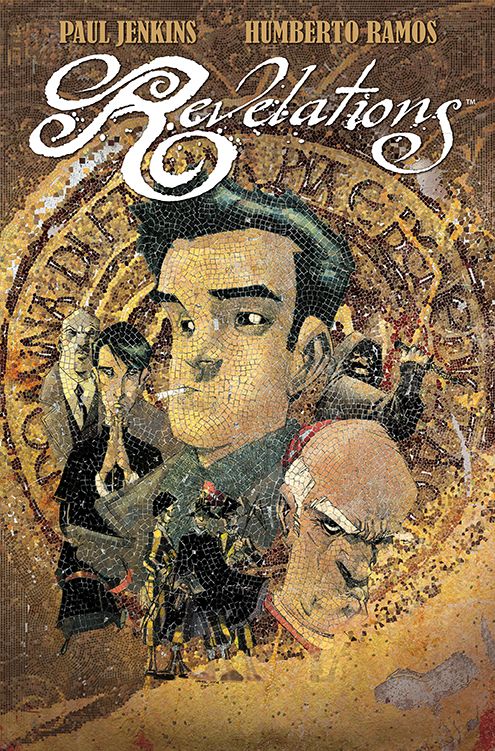Paul Jenkins had a heck of a 2013. The writer known for runs on Big Two titles including "Incredible Hulk," "Sentry," "Batman: The Dark Knight" and "Peter Parker: Spider-Man" surprised the industry in May when he wrote a public letter to the comic community explaining his decision to stop writing for Marvel and DC in order to focus his creative efforts at BOOM! Studios with an exclusive contract. "I'm finally going to make myself happy again," Jenkins said in the letter.
EXCLUSIVE: Paul Jenkins Goes All BOOM!
Since then, the writer helped BOOM! build "Deathmatch" with artist Carlos Magno, an epic 12-issue series that not only created a whole new world of capes and cowls, it also pitted super-people against each other with real consequences. Jenkins re-teamed with his "Spider-Man" collaborator Humberto Ramos to bring their wildly successful Kickstarter project "Fairy Quest" to BOOM!, who releases the first softcover collection this week. Speaking of Jenkins-Ramos collaborations, the duo decided to reprint their 2005-2006 Dark Horse miniseries "Revelations" at BOOM! with the first issue hitting stores December 31, 2013.
Between the conclusion of "Deathmatch," which wrapped up earlier this month with issue #12, the continuing saga of "Fairy Quest" and other upcoming projects in the works, it seemed like the perfect time for CBR News to speak with Jenkins and talk about everything that went on this year as well as his plans for the future.
CBR News: Congrats on the completion of "Deathmatch." How does it feel to have the book done and out?
Paul Jenkins: When I first got to talk to the guys at BOOM! I was actually at an interesting point in my career. I wasn't sure if it was going to be the way I've always wanted it to be and the way it had been over time. There are certain periods in comics history, aren't there? There's the black-and-white explosion and then crossovers galore. Nowadays it's like movies galore. I think, as creators, we're driven by a combination of three things: our need for money, because we work for a living; our love of the recognition and the small amount of fame that comes with it; and then our love for the creation.
I just happen to have been a guy who's been almost exclusively driven by my love of the creation. But, I'm a dad and a family guy, I have a wife and children to provide for, so money [is important], but I've never been that good at self promotion. Really, where I have been coming from is wanting to make great stuff. Over time I've been given tremendous opportunities to do stuff like that like "Inhumans," "Civil War," "The Sentry," and "Captain America."
Jenkins Arranges "Deathmatch" For BOOM!
I felt like that was beginning to go away because there was a reliance on crossovers and silly, trendy movie tie-ins. I was beginning to decry the mainstream a little bit and felt that the mainstream isn't capable now of supporting really interesting, innovative, risk-taking stories because they have to maintain the core product. The core product in comics 12 years ago was comics; the core product for comics today is movies. So you can't really do something audacious in a lot of comics now. Understandably, the publishers can't allow that to happen.
That's a very long-winded intro, but that's what guided me into BOOM! and "Deathmatch." BOOM! came to me and said, "Please do the things that you're good at, that you like to do. We have a shell of an idea which pits heroes against each other." That was the basic idea they came to me with and they said, "If we had you come on board, what would you do?" My response was, "How about you actually let me create a world? Let me create a superhero universe."
BOOM! asked me what I wanted to do and I missed the days of Marvel Knights when Marvel needed a guy like me to come in and fix stuff. In those days I think I was seen as a fixer guy. "We just ran the Hulk into the ground. Hey, Paul can you come back and fix it up a little bit?" I'm always about thematic stories and things that have a reason to live. We used to do that back in the Marvel Knights days and it just had to go away by default.
So here's BOOM! saying they wanted me to do the things that make me the happiest creatively and so we started. It really took on a life of its own. I proposed this 12-issue story and ran it through my editors. We moved it around a little bit, laid it out and said we were going to do this. It had a really cool ending. Then we started doing it and as you start a story like you get a lot of happy accidents. It's a testament to the editorial staff at BOOM! When we had one of those happy accidents and we had an even better idea for this part of the story, we changed the original pitch and moved it around. They were always supportive and trusting of me as the creator. Hopefully at this point in my career I've earned enough trust from editors that they'll allow me to do things.
In the end, "Deathmatch" has come out and I think it's a pretty successful story. I know that the readers that follow it absolutely adore it. One of the testaments to that is, I don't really go by online reviews because it's difficult to know really what's going on, but I do challenge anyone to find some negative ones because the fans love it and the reviewers like it, so I think it's been a tremendous success.
It sounds like it was a good transition project of sorts because it's still superheroes, but it also has the freedom of a creator-owned type book.
Yeah, I think so. In my career I've always heard the things that you can not do. When I went to write Spider-Man all I heard was, "You can't write Spider-Man these days. Spider-Man's finished. The stories have all been written so there's nothing else you can do." My response is, "What are you talking about? That's a silly thing to say," but I heard it a lot when I took on Spider-Man. Mark Buckingham and I came in, did our first single issue and kind of disproved that notion. Spider-Man is a perfectly viable character if you can just tell a good story with him.
I think that this is a transition project in that, yes, it has superheroes, but really it's a story about people under extreme circumstances and heroism with some mystery to it. The most important part to me is that they would always say you can not build a new superhero universe from scratch and yet a lot of the fans that really like it like the characters, understand them and know what they're about.
One of the nice things about the growing popularity of superheroes in pop culture is that it seems like more people understand the basics of a superhero universe than in years past.
I think so. There's a little absurdity to the situation as well. For the longest time the mainstream entertainment had been crime stories, science fiction and stuff like that and superheroes were absolutely not mainstream whatsoever. Yet, in the comic industry, superheroes are mainstream and stories about anything else are not considered mainstream which I think is a real shame.
That's what I wish we could change and return to the days of the '50s where there were lots more horror comics like "Tales to Astonish" and "Uncanny Tales." Those comics are so interesting and vibrant. I'm thinking we're going to get there, but I think we have to move through the superhero genre to get there again.
Do you see the audience opening up more thanks to wider exposure and the proliferation of digital comics?
I think so. That's really the point. We have to get to that point where there are some really interesting comics. I've said this before in interviews, but Spider-Man isn't really about a guy who dresses up in his underwear and punches people really hard. It's sometimes not even about heroism, it's about real life. The guy under that mask is us. We can see ourselves not being able to get home from school in time. Most of what we care about with Spider-Man is about the person cares about, not what the superhero cares about.
The best written superheroes are like that. Batman is tremendously interesting because he's such a tragedy. He can never bring his parents back to life and he desperately needs to do so. So he's a brilliant character. I would like to think that where I've made my way in this country and in this business is trying to find a character and just drilling into that character to work out the person. I'm not so interested in the big fights and all that stuff. A part of my career has been learning to do the big fights and the big interesting visual scenes that get the fans excited as well.
Do you think you adjusted to that balance in the pages of "Deathmatch" with artist Carlos Magno?
We had a brilliant artist on it. Carlos is really good at doing those being action scenes. What I was thoughtful for and I think I got from him was moments that are quiet. What makes us care about the fight is if we care about the people in the fight. So when the Sable character sits down next to her nemesis, that's like Batman sitting next to the Joker. They're like, "We need to have a discussion." They have this discussion and its really quite interesting. And once you've seen the two of them talking realistically about what must happen in their world then when they fight you realize what's behind it. If there's nothing behind it and you're watching the two of them go at each other, you don't care as much and that's what I try to avoid.
Earlier this year when you wrote the open letter to the comic industry about moving from DC and Marvel over to BOOM!, what was the reaction like from the fans and your fellow creators?
I have to be careful how I answer this. I got quite a number of private e-mails from creators saying they were grateful that I spoke up, and grateful that I did so without coming across as too strident. In some cases, creators validated my concerns for this industry by providing their own tales of woe regarding treatment they've received lately. Now let's be clear about one thing: these creators are not in a position to simply step forward and declare their support publicly because they have jobs and need to feed their families. This entire thing is extremely unfortunate, and I for one would rather it were not the case. I wish there was no bullying of creators and if there is, I wish it would go away. But it will not go away until we acknowledge the misbehavior and put a stop to it.
As far as the fans go, I think the reaction was pretty predictable in that some defended DC and some used it as an opportunity to attack DC. Again, I would prefer that we look more at the work and the creators' output and less at the factions involved. I wish it were the case that the fans made demands of good quality from the publishers. But that's not realistic.
It seems like some of the negative behind-the-scenes stuff is starting to make itself more public these days.
Yes, it has become quite disconcerting. I think we should focus more on the positives of creating a good product and less on the personal politics -- people's lives and livelihoods are greatly affected when corporate employees misuse their positions to make unreasonable demands of those supplying them a service. I hope that my comments will have some positive effect on the treatment of creators -- only time will tell. If anything, I hope it casts a spotlight on certain individuals within this industry and at the very least encourages them to behave.
In the interests of fairness, I should say that DC has always been very forthcoming about international sales and the reporting of royalties to creators, and I credit them for that. In many ways, it is a few individuals within a company that are making things very hard on other human beings, which is unfortunate. The playing of favorites, the "cover-your-ass" mentality, the subtle and not-so subtle threats and the general cavalier mistreatment of creators should never happen, but it does.
Well it sounds like BOOM! has been a great fit for you right now.
I found while working with BOOM! on "Deathmatch" that I was home. Then I spoke to [BOOM! Founder] Ross Richie and he gave me this great feeling about how much he cares about comics. Did you know that the guys like [Editor-in-Chief] Matt Gagnon, Ross Richie and [Vice President of Publishing and Marketing] Filip Sablik, they don't actually watch the editorial as it happens. They wait until the books come out to read them. That's awesome. It shows that they love the stories and care about them. When "Deathmatch" #11 came out, Filip Sablik wrote to me and said, "That was great!" I thought that was so funny.
What do we as fans want from a company? We want a company that will -- if it's just comics we're talking about -- ultimately say, "Man I want those fans to get $5 worth of entertainment for every $3 or $4 they put in."
In addition to "Deathmatch" you also brought "Fairy Quest," your fantasy book with Humberto Ramos that was an early Kickstarter success, to BOOM! Are you planning more books in that world?
That is something I can definitely speak to. We are on "Fairy Quest 2." It's a real success at Kickstarter. We're going to put up "Fairy Quest 2" very soon in January. We're doing that in collaboration with our friends at BOOM! That was always mine and Humberto's book. When we do that, it will also be a BOOM! book just like the first one was and they'll come out with the serialized #1 and they will do it with us.
There are other stories in that world of Fablewood, because Fablewood is a place where all of the stories that have ever been told all being put in one place, so you can get into crime fiction and science fiction as well. It's a big world that I created years ago that we put "Fairy Quest" into. Fans adore "Fairy Quest," they absolutely love it so they'll be pleased to know that we're coming out with some new "Fairy Quest" books.
On the topic of returning to the worlds you've created, are there plans to revisit the world of "Deathmatch" in the future?
Yes. A couple of things. Number one, if they're dead, they're dead and that's just how it is. Here's why. On day one I asked them for an agreement between writer and publisher that, if we kill someone, I did not want to bring them back. The fans have no consequences in their stories. "Hey, Wolverine died last month," "Don't worry, he'll be back." It's just getting ridiculous. I said I wanted to create these characters and any ones we kill are dead and they're never coming back. Not ever.
I got some letters from fans when Omni-Engine died saying, "I loved that guy. Are you bringing him back?" The answer is no, but guess what, we'll create new ones. Don't worry. If you loved him and we managed to get you to love him in seven issues, then we can keep doing that.
There are some prequels in play in that universe and also a clear thing that I'm going to do within that universe after the Deathmatch. There's big plans, but I can't be specific about it much more than that because it's up to the publisher.
Can you tease any other projects you're working on right now?
I've got two creator-owned books that I will co-publish with BOOM! They're new series that seemed like cool stories. We've got a bunch of those lined up. I'm going to be plenty busy with BOOM! over the next couple years.
In addition to the new projects, you and Humberto are also reprinting "Revelations" with BOOM! How did that come about?
They asked us to. They wanted us to. The thing about "Revelations" is that it didn't really hit the biggest audience in America. It sold a little bit and then went away. You could solicit it today and it would almost find an entirely new audience. I feel like, why not? Why not do something amazing? Why not show these people that a modern mystery that's set in the Vatican is just as viable a graphic novel as anything.
When that book came out, all Humberto and I got were compliments about how clever that story was and how beautiful it looked. Sometimes I think any mainstream creators like myself and Humberto tear our hair out to say, "Wait a minute. You loved the story. There's not a single person that moaned about it. You like the character. You think it's clever, interesting and beautiful, but the sales were rotten." Humberto and I were on "Spectacular Spider-Man" and we couldn't buy an audience for ["Revelations"] and yet in Europe it was massive.
So that's where we're at. We're putting it out and promoting it. Both fans who like mine and Humberto's work should come to "Revelations" and buy that book. Trust me, it's awesome.
With so many creators returning or moving towards creator-owned comics these days, it seems like the audience might be there, whereas it wasn't a few years ago.
I do think that, in many ways, myself and Humberto were forerunners for that. When we put "Fairy Quest" up on Kickstarter, we really took a risk. I think we were the first two mainstream creators to do one of our biggest projects on there. And, we asked for $60,000 and it succeeded. That was scary, because if it hadn't, we would have been throwing ourselves to the wolves. Now Frank Cho has a project up there which is great. I think Kickstarter is awesome.
What we're doing with "Fairy Quest 2" is perfect because we're putting it up on Kickstarter, we allow the same fans to be our publisher and work with us, but then we have a collaborator like BOOM! that can help us with fulfillment. The biggest problem with Kickstarter, as anyone who followed "Fairy Quest" knows, is that the fulfillment was a nightmare so we're having BOOM! help with all of that.
We have a great outlet like Kickstarter and a great publisher like BOOM! to help us. I expect to do an awful lot more with Kickstarter. Kickstarter and BOOM! collectively is great as well.
"Deathmatch" #12 and the "Fairy Quest: Outlaws" softcover are on sale now. The reprint of "Revelations' #1 is on sale from BOOM! Jan. 1.





